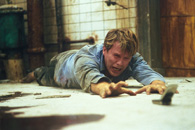

|
| home | movie reviews | features | sov horror | about | forum |
Saw C
Year Released: 2004
If nothing else, Saw is proof that you can make a professional-looking film without a lot of money. Purportedly shot for a paltry $1 million, it nonetheless features a potent atmosphere, a polished sense of confidence, and a marquee of modest stars in Cary Elwes, Monica Potter, and Danny Glover. It's a testament to solid craftsmanship and a promising start for first-time director James Wan. Unfortunately, a big part of that trick also proves Saw's undoing. For the image and tone it so efficiently creates is nevertheless fairly shopworn, and though it has its share of unsettling moments, it's not nearly as scary as it wants to be. Certainly, Saw owes a great deal to Seven and similar works... perhaps too much. It succeeds in recreating the grungy, fluorescent-lit nihilism of David Fincher's seminal thriller, and posits a scenario whose essence, at least, has some punch. But despite that, and despite yeoman efforts by Wan and his team, it never really finds its legs. Too many logical gaps rear their ugly heads; too much of the plot is half-baked and awkward. And while the suspense sometimes works, it can't help but feel like leftovers from earlier, better movies. The centerpiece is yet another serial killer -- this one named "Jigsaw" -- with a dark agenda and the ability to outsmart anyone who dares to challenge him. He's indicative of the film's mixed bag; though part of an increasingly insufferable cliché, he's had more energy and imagination invested in him than most. His specialty is placing his victims in horrifying circumstances, and then seeing how far they will go to keep themselves alive. The idea is to teach them how precious life is, though considering his body count, the lesson isn't taking very well. Nonetheless, there's a kind of eerie resonance to his methodology, which at times shows real imagination. Wan works hard to make the most of it, reveling in the ghoulish details of Jigsaw's traps and -- during Saw's best moments -- forcing us to contemplate what we would do under such circumstances. Nowhere is this more evident than in the opening, one of the most harrowing parts of the film. In a filthy, underground bathroom, two men awaken to find themselves chained to the pipes. The feckless Adam (screenwriter Leigh Whannell) is jittery and on edge while the quieter Dr. Gordon (Elwes) is calm enough to start thinking of ways out. A dead man lies between them, having apparently shot himself in the head; the revolver is still clutched in his hand. A message from Jigsaw informs them that Dr. Gordon has eight hours to kill Adam; if he doesn't, then both men will die, along with Dr. Gordon's family. They each have a hacksaw, which isn't strong enough to cut their chains, but will carve through flesh and bone quite nicely. The setup plays into the film's strengths, creating an atmosphere of confusion and paranoia with only a few ground rules -- set by a madman -- to which the audience can cling. More importantly, it allows its heroes to genuinely think their way through their dilemma, seeking creative solutions only to find the killer two steps ahead of them. The process is eerie and unsettling and Wan clearly has a knack for such mind games, resulting in several intense, horrifying patches where Saw really hits its stride. Unfortunately, that promise never quite reaches fruition. The opening scene eventually gives way to an unwieldy flashback narrative, in which we trace the path of Jigsaw's project and the police hunt for him (which centers around a then-free Dr. Gordon). The back-and-forth between these precursor segments and the chained men in the bathroom is unduly intrusive, and achieves more in piecemeal than it does as a unified whole. When things start to labor, Saw falls back on flat-out clichés, pushing well-worn buttons when it should be finding new ways to surprise us. Internal logic starts to suffer as well, and the "wait a minute, why can he just...?" questions pile up faster than the film can compensate for them. Wan tries to gloss it over with the usual cocktail of shocks and twists; but despite a gallant effort, they lack the punch to silence our doubts. An aimless subplot involving Glover's unhinged police detective further compounds matters, leaving Saw with a final grasp achingly short of its reach. Were it merely a routine thriller, such dashed hopes would be expected, but Saw's disappointments cut deeper because the filmmakers clearly have more on their minds. This is not a film that wants to settle for second-rate status. It tries hard, it works overtime, and at times, you can see quite clearly where it wants to go. But its limitations prove too cumbersome, and though occasionally frightening, it never musters the juice to clear its hurdles. Saw shows all the ambitions of a great thriller -- give Wan and his crew some time and they'll probably make one -- but right now, ambition alone just isn't enough. Review published 10.29.2004.
|

|
| home | movie reviews | features | sov horror | about | forum |
| This site was previously at flipsidemovies.com from 2000 to 2008. |
|
contact | copyright | privacy | links | sitemap
Flipside Movie Emporium (FlipsideArchive.com)
|